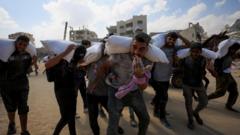As the conflict in Gaza enters a crucial phase, significant evidence has emerged of war crimes attributed to both Hamas and Israel, leading to growing frustration among Israel’s traditional allies. The call for accountability and humanitarian aid becomes critical as politicians wrestle with their stances on the ongoing violence.
Evidence of War Crimes Mounts in Gaza Conflict: Allies Grow Restless

Evidence of War Crimes Mounts in Gaza Conflict: Allies Grow Restless
Recent developments in the Israel-Gaza conflict highlight an increasing discontent among Israel's allies, amid allegations of war crimes on both sides.
The ongoing Israel-Gaza conflict has reached a critical juncture, driving a wedge between Israel and its allies as mounting evidence of war crimes emerges from both sides. Two years ago, as Hamas laid the groundwork for its surprise attack on October 7, 2023, Israeli Prime Minister Benjamin Netanyahu was solely focused on managing the Palestinian issue, while prioritizing his long-term goals of countering Iran and normalizing relations with Saudi Arabia. However, he has faced mounting criticism for not taking responsibility for the operational failures that allowed Hamas to execute its devastating plan.
The historical conflict between Jews and Arabs remains unresolved, and recent events have escalated tensions anew. The landscape of the Middle East has drastically shifted since the recent outbreak of violence, leading to heightened scrutiny of Israel's military actions in Gaza. Following restrictions on international journalists reporting from the area, the continuing conflict has become difficult to accurately depict. Since the onset of the conflict, nearly 200 Palestinian journalists have died in pursuit of the truth.
Initial attacks by Hamas on October 7 resulted in significant civilian casualties, prompting accusations of war crimes against the organization. However, Israel now faces similar allegations that include the starvation of Gazan civilians and disproportionate military responses leading to substantial civilian deaths. Legal actions against Netanyahu and his defense minister have sparked outrage as they deny these accusations while labeling them as antisemitic.
Israel's allies are expressing impatience with its actions in Gaza, with recent declarations issued by multiple governments condemning the country's military tactics. Particular concern has been raised over the state of aid distribution for Gazan civilians, described by foreign ministers as dangerous and degrading. Aid agencies have reported that nearly 800 Palestinians have died while seeking basic provisions during the military operations.
Amidst this tension, an impending summer recess in Israel's Knesset may provide Netanyahu with temporary relief from pressures for a vote of no confidence. However, the reluctance to negotiate a ceasefire continues to draw criticism, especially from members of the Israeli coalition government. A ceasefire remains a potential avenue for humanitarian relief and a chance for future diplomatic efforts, even as the conflict itself shows no signs of resolution.
The world watches closely as accusations of severe war crimes linger, and the international community grapples with how to respond—each decision carries long-term consequences for the future of peace in the region.



















